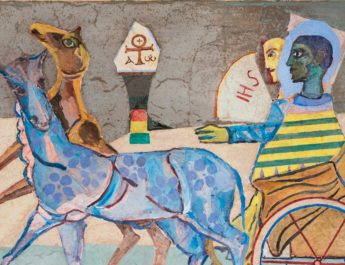Psalm 39
To the leader:A to Jeduthun.B A PsalmC of David.D
A “leader” = natsach. Properly, something that glitters from a distance. So, something that stands out, excels, has status/standing (such as a chief musician or superintendent of Temple services). This can also mean to be permanent or enduring.
B “Jeduthun” = Yeduthun. 17x in OT. From yadah (to throw one’s hands into the air in a gesture of praise, to give thanks, or make a confession); from yad (hand, ability, power; hand in a literal sense; what one can do or the means by which one does it). This is Jeduthun or Yeduthun, meaning “laudatory.” He was a temple choir leader.
C “Psalm” = mizmor. From zamar (making music; used specially of music to worship God; music with singing, singing praise, singing psalms); may be from zamar (to trim or prune). This is a melody or a psalm.
D “David” = David. From the same as dod (beloved, love, uncle); the root may mean to boil, which is used figuratively to describe love. So, this implies someone you love such as a friend, a lover, or a close family member like an uncle. David’s name likely means something like “beloved one.”
1 I said, “I will guardE my waysF
that I may not sinG with my tongue;H
E “guard” = shamar. This is to keep, watch, or preserve. It means to guard something or to protect it as a thorny hedge protects something.
F “ways” = derek. From darak (to tread, march, to walk. Can also mean affixing a string to a box since one needs to step on it to bend it in the process; so also an archer). This is a road as a thing that is walked on. Can be used figuratively for the path that one’s life takes or how one chooses to live one’s life.
G “sin” = chata. This is properly to miss, and so figuratively it is used for sinning, bearing the blame. It implies a forfeiture or loss of something.
H “tongue” = lashon. This is tongue, talker, language, or wedge. It can also be a tongue of flame or a water cove.
I will keepI a muzzleJ on my mouthK
as long as the wickedL are in my presence.”
I “keep” = shamar. Same as “guard” in v1. See note E above.
J “muzzle” = machsom. 1x in OT. From chasam (to muzzle, stop, block). This is muzzle or bridle.
K “mouth” = peh. This is mouth in a literal or figurative sense. So, more literally, it can be beak or jaws. More figuratively, it refers to speech, commands, or promises.
L “wicked” = rasha. This is to be wicked, guilty, make trouble, do wrong. It can also be condemn, guilty, inflict punishment. This verb implies disturbing or violating.
2 I was silentM and still;N
I held my peaceO to no avail;P
my distressQ grew worse,R
M “was silent” = alam. 9x in OT. This is to bind or tie fast. When applied to the mouth, it means to be silent or speechless. This can be voluntary or involuntary.
N “still” = dumiyyah. 4x in OT. From the same as dumah (silence). This is silence or stillness. Figuratively, it could be trust or death.
O “held my peace” = chashah. 15x in OT. This is silent or not doing anything.
P “avail” = tob. From tob (to be pleasing, to be good). This is good, beautiful, pleasant, agreeable, bountiful, at ease. This word is used for goodness as a concept, a good thing, a good person. This can refer to prosperity and welfare as well as joy, kindness, sweetness, and graciousness. So, this is ethically good, but also enjoyably good.
Q “distress” = keeb. 6x in OT. From kaab (being in pain, be sad, grieve, spoil, mar). This is a pain or sorrow. It is suffering whether physical or emotional.
R “grew worse” = akar. 14x in OT. This is properly to stir water – figuratively it can be to trouble, harm, afflict, or worsen.
3 my heartS became hotT withinU me.
While I mused,V the fire burned;W
then I spokeX with my tongue:
S “heart” = leb. May be related to labab (to encourage; properly, to be encased as with fat; used in a good sense, this means to transport someone with love; used in a bad sense, it can mean to dull one’s senses). This is the heart, courage, one’s inner self, the mind, or the will. Heart is only used in a figurative sense in the Old and New Testaments.
T “became hot” = chamam. 13x in OT. This is to be warm, heat. It is to be hot in a literal or figurative sense, to mate.
U “within” = qereb. Perhaps from qarab (to come near or approach). This is among, in the midst, before, the center It is the inward part, whether literal or figurative. It can also be used for the heart, the site of thoughts and feelings. This word is also used as a technical term for the entrails of the animals who are sacrificed.
V “mused” = hagig. 2x in OT. Perhaps related to hagah (to speak, declare, make a sound, imagine, or mutter; a murmur, moan, or growl, whether from delight or anger; to study, ponder, or meditate) This is a murmur, whisper, groaning, complaint, or meditation.
W “burned” = ba’ar. This is to burn, consume, heat, remove. It can also be to consume by a fire or through eating, being brutish or wasting.
X “spoke” = dabar. This is generally to speak, answer, declare, or command. It might mean to arrange and so to speak in a figurative sense as arranging words.
4 “Lord,Y let me knowZ my end,AA
and what is the measureBB of my days;
let me know how fleetingCC my life is.
Y “Lord” = YHVH. From havah (to be, become) or hayah (to come to pass, become, be). This is the name of the God of Israel, the self-existent and eternal one, the tetragrammaton. This pronunciation has been lost to time so “Lord” is generally used in its place.
Z “know” = yada. This is to know, acknowledge, advise, answer, be aware, be acquainted with. Properly, this is to figure something out by seeing. It includes ideas of observation, recognition, and care about something. It can be used causatively for instruction, designation, and punishment.
AA “end” = qets. From qatsats (to cut or chop off in a literal or figurative sense). This is outer border, end, or extremity. It can also mean infinite.
BB “measure” = middah. From mad (measure, cloth, cloak, armor, stature, height); from madad (to measure, stretch, be extended, continue). This is a measure, size, garment, height, width, or tribute.
CC “fleeting” = chadel. 3x in OT. From chadal (to cease, fail, neglect, reuse, stop; figuratively, to be idle or come up short). This is lacking, forsaken, rejected, vacant, destitute, or frail.
5 DD You have made my days a few handbreadths,EE
and my lifetimeFF is as nothing in your sight.
DD {untranslated} = hinneh. From hen (lo! Behold! If, though; an expression of surprise). This is to draw attention, show suddenness or surprise, or to emphasize the importance of the coming statement. See! Lo! Behold!
EE “handbreadths” = tephach. 4x in OT. From taphach (to flatten, spread, span, swaddle, nurse a baby). This is a span, the width of a palm, coping (architecture).
FF “lifetime” = cheled. 5x in OT. Root may mean to glide along quickly. This is life or a lifetime as a short length of time. It can also be an age, duration, or the world – all as transient.
Surely everyoneGG standsHH as a mere breath.II SelahJJ
GG “everyone” = kol + adam. Literally every person. Adam is perhaps from adam (to be red, make ruddy); related to adamah (ground, dirt, earth). This is man, humankind, also Adam’s name. It refers to a human individual or humanity.
HH “stands” = natsab. This is to station, appoint, establish, take a stand.
II “breath” = hebel. This is emptiness, vapor, breath. It can refer to something that is fleeting or futile, worthless or a delusion. Something that is passing and so does not satisfy. This is related to the root for the name “Abel.”
JJ “Selah” = selah. From salal (to lift up, build, pile, extol, exalt; can also be used for opposing as a dam holds back water). This is to lift up or exalt. Also, “selah” in the psalms where its precise meaning is uncertain. It could be a pause in the music, a moment of silence. It could signal a change in the service or mean something akin to amen.
6 Surely everyoneKK goes aboutLL like a shadow.MM
Surely for nothingNN they are in turmoil;OO
they heap up, and do not know who will gather.PP
KK “everyone” = ish. Perhaps from enosh (human, humankind, mortal); from anash (to be weak, sick, or frail). This is man, husband, another, or humankind.
LL “goes about” = halak. This is go, come, walk. It is walk literally and figuratively and includes people and animals. It can be used figuratively for one’s moral life – how we walk according to God’s way or against it. It can also refer to the walk of life as in the course one’s life takes, the choices we make, etc.
MM “shadow” = tselem. 17x in OT. Root may mean to shade. This is a phantom, resemblance, illusion, image, or an idol.
NN “nothing” = hebel. Same as “breath” in v5. See note II above.
OO “are in turmoil” = hamah. This is to growl or roar, be disturbed, mourn, yearn. It is being noisy so it can imply tumult, rage, war.
PP “gather” = asaph. This is to gather, assemble, or bring. It can also mean to take away, destroy, or remove.
7 “And now, O Lord,QQ what do I wait for?RR
My hopeSS is in you.
QQ “Lord” = Adonai. From adon (lord, master, owner); root means to rule or be sovereign. This is the actual Hebrew word for Lord used (in a different form) of humans and (in the present form) of God. It means someone who is in control.
RR “wait for” = qavah. It can mean to bind or gather together, especially in the sense of twisting together. In that light, it can mean collect. Figuratively, this can mean to wait, await, expect, or tarry.
SS “hope” = tocheleth. 6x in OT. From yachal (to wait, which implies patience, hope, and trust; can also be pained waiting). This is hope or expectation.
8 DeliverTT me from all my transgressions.UU
Do not make me the scornVV of the fool.WW
9 I am silent; I do not open my mouth,
for it is you who have done it.
TT “deliver” = natsal. This is to snatch someone or something away in a good sense – as rescue, defend, or deliver – or in a bad sense – as strip or plunder.
UU “transgressions” = pesha. From pasha (to rebel, offend, quarrel; making a break from proper authority so can also refer to an apostate). This is transgression, rebellion, or sin. It could be a revolt on a national scale or an individual moral one.
VV “scorn” = cherpah. From charaph (to expose and so figuratively to reproach, defame, carp at, defy). This is reproach, rebuke, shame, or disgrace. It can also refer to genitals.
WW “fool” = nabal. 18x in OT. From nabal (to be foolish, senseless, fall away, faint, wither, to be wicked, disgrace). This is foolish or a fool. It can also mean impious. Nabal, taken from this root, was the name of Abigail’s first husband in 1 Samuel 25.
10 RemoveXX your strokeYY from me;
I am worn downZZ by the blowsAAA of your hand.BBB
XX “remove” = sur. This is to turn aside in a literal or figurative sense – to depart, decline, rebel, remove, or withdraw.
YY “stroke” = nega. From naga (touch, reach, arrive, come near, strike; touching for any reason including sexual or violent). This is a blow or stroke, wound, sore, mark plague. It can refer to someone with leprosy or to dress.
ZZ “worn down” = kalah. This is to end, be finished, complete, prepare, consume, spent, or completely destroyed.
AAA “blows” = tigrah. 1x in OT. From garah (to contend, provoke conflict, stir up strife, meddle; properly, to grate – figuratively to cause anger). This is strife, hostility, opposition, or a blow.
BBB “hand” = yad. Perhaps related to “Jeduthun” in superscript. See note B above.
11 “You chastiseCCC mortalsDDD
in punishmentEEE for sin,FFF
CCC “chastise” = yasar. This is to discipline, correct, train, teach, punish. Literally, it is disciplining with blows, but figuratively using words.
DDD “mortals” = ish. Same as “everyone” in v6. See note KK above.
EEE “punishment” = tokechah. From yakach (o decide, be right, argue, or convince; to decide, convict, reason together, or reprove). This is correction, rebuke, punishment. It can also be evidence used in court.
FFF “sin” = avon. Perhaps related to avah (to bend, twist, be amiss). This is sin, mischief, guilt, fault, punishment for iniquity, or moral evil.
consumingGGG like a mothHHH what is dearIII to them;
surely everyone is a mere breath. Selah
GGG “consuming” = masah. 4x in OT. This is to melt, become liquid, consume. Figuratively, it can also be melt from fear.
HHH “moth” = ash. 12x in OT. From ashesh (to shrink or waste away; figuratively, to fail or be consumed). This is moth, moth-eaten, maggots, or grass.
III “is dear” = chamad. This is to desire or delight in someone or something. It can also mean something that is precious or coveted. So, it can also refer to lust.
12 “HearJJJ my prayer,KKK O Lord,
and give earLLL to my cry;MMM
JJJ “hear” = shama. This is to hear, call, consent, or consider. It implies listening intelligently, giving attention, and, because of these two factors, obedience and action are often implied.
KKK “prayer” = tephillah. From palal (to judge for oneself or in an official capacity; to pray or make supplication, to entreat). This is prayer or intercession. It can also be a hymn.
LLL “give ear” = azan. Perhaps from ozen (ear, earing, audience, show; properly, broadness – applied to its ear in reference to its shape). Properly, this is to expand or broaden one’s ear i.e. listen intently, pay attention, heed.
MMM “cry” = shavah. 11x in OT. From shava (crying or shouting aloud; seeking freedom from some kind of trouble). This is cry, cry for help.
do not hold your peaceNNN at my tears.OOO
For I am your passing guest,PPP
an alien,QQQ like all my forebears.RRR
NNN “hold your peace” = charash. This is to scratch, which implies etching or plowing. It can mean to manufacture regardless of materials used. Figuratively, it can be to devise or conceal. It can also have a sense of secrecy. Hence, being silent or left alone. It can also be speechless.
OOO “tears” = dimah. From dema (juice, liquor); from dama (to weep). This is tears from weeping.
PPP “passing guest” = ger. From gur (to abide or sojourn; to leave the road to lodge or for any other reason). This is sojourner, guest, stranger, foreigner.
QQQ “alien” = toshab. 14x in OT. From yashab (to sit and so to remain and so to dwell; sitting for any reason – as a judge, in order to ambush, or just sitting quietly; can mean settling or marrying; continue, endure, or establish). This is sojourner, settler, tenant. Someone who lives in a foreign land – not native born.
RRR “forbears” = ab. This is father, chief, or ancestor. It is father in a literal or figurative sense.
13 Turn your gazeSSS away from me, that I may smile again,TTT
before I departUUU and am no more.”
SSS “turn your gaze” = shaah. 15x in OT. This is to gaze at, gaze around, regard – to look to, especially for help. It is to consider or be compassionate. It could also be to look at in amazement or while confounded.
TTT “may smile again” = balag. 4x in OT. This is to smile, be cheerful, comfort, regain strength. It is to break from in a positive or negative way – it can mean to cease grieving.
UUU “depart” = halak. Same as “goes about” in v6. See note LL above.
Image credit: “1996 Jocassee Quiet Solitude” by anoldent, 2007.




